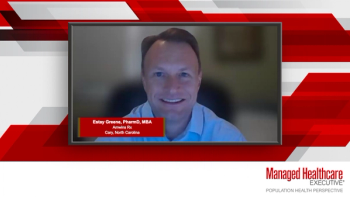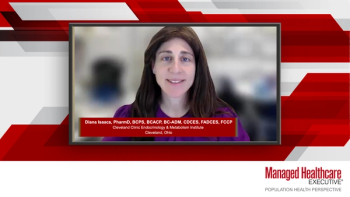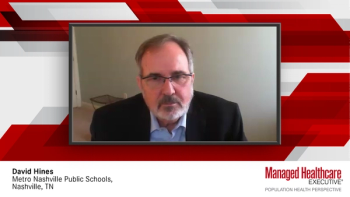
Focusing on preventing diabetes and reducing disparities across populations, Dr Greene highlights ways to improve affordability and access to new treatment technologies.

Focusing on preventing diabetes and reducing disparities across populations, Dr Greene highlights ways to improve affordability and access to new treatment technologies.

Estay Greene, PharmD, MBA, outlines the main barriers that need to be addressed from a payer perspective in the treatment of high-risk patients with diabetes.

An expert on the treatment of diabetes offers insights on utilizing data to reveal disparities in care based on factors such as demographics and location.

Payer perspectives on the challenges and advantages of integrating continuous glucose monitoring into diabetes management programs, highlighting the navigation of prior authorization requirements.

Insights on how payers can allocate their resources to best improve outcomes for patients with diabetes.

Estay Greene, PharmD, MBA, offers key takeaways and provides closing thoughts on remaining unmet needs in the treatment of patients with diabetes.



Diana Isaacs, PharmD, BCPS, BCACP, BC-ADM, CDCES, FADCES, FCC, discusses how technological advancements in diabetes care, such as continuous glucose monitors, can help patients better manage their disease.

Diana Isaacs, PharmD, BCPS, BCACP, BC-ADM, CDCES, FADCES, FCCP, discusses socioeconomic barriers, such as financial constraints, unstable housing, stressful living situations, and demanding work schedules, can hinder diabetes self-care, requiring healthcare providers to approach patients with empathy when addressing these challenges.




David Hines examines the profound impact of social determinants like food insecurity, housing instability, and limited access to healthcare services on the health outcomes of individuals with diabetes, while also delving into the multifaceted barriers hindering effective diabetes management and offering insights to overcome these challenges.

A diabetes expert investigates how comorbidities like obesity, hypertension, hyperlipidemia, and depression impede effective diabetes management, while concurrently exploring potential health plan benefits that could synergistically address these coexisting conditions to improve overall care.

David Hines underscores the criticality of routine monitoring for members with diabetes, encompassing glycemic control, blood pressure, and cholesterol levels, while simultaneously highlighting the indispensable nature of patient buy-in, engagement in daily self-management routines, and access to educational resources to bridge prevalent knowledge deficits, all geared towards optimizing diabetes care.

A diabetes expert examines how digital devices, virtual care access, and medication therapies can enhance convenience, outcomes, and cost-effectiveness in diabetes management, spotlighting the transformative potential of continuous glucose monitors to empower patients and elevate the quality of patient care.

A diabetes expert investigates the personal factors impacting patients' adoption of diabetes devices and technologies, while concurrently exploring specific plan policies, wellness initiatives, and benefit designs that could most effectively and equitably enhance diabetes outcomes across diverse demographic groups.